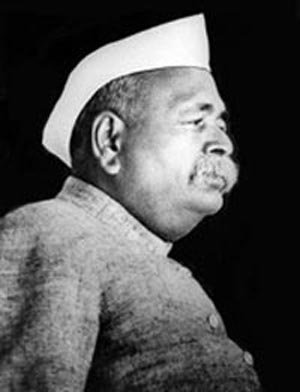
Govind Ballabh Pant was born on August 30, 1887 in Shyahi Devi hills in Almora district of Uttarakhand. His mother’s name was Govindi. His father, Manorath Pant, was constantly on the move. Govind was brought up by his grandfather, Badri Dutt Joshi, who played a prominent part in molding the youngster’s views. Govind greatly respected his grandfather’s firm belief in honesty and tried to inculcate them into his own life.
In his school he showed a remarkable and impressive growth. He excelled in studies, especially Mathematics and was a leader amongst his classmates. After finishing school, Pant made plans to go to Allahabad to further his education but was discouraged by his relatives on account of Pant’s delicate health. The incentive to obtain further education was far grater then his concern towards his health. He said farewell to his relatives and left for Allahabad in 1905. Pant enrolled at the Muir Centeral College where his ingenious and radiant personality was quickly recognized by his professors. He excelled in the fields of Mathematics, Literature and Politics. Even though his health continued to suffer throughout his College career, his avid ambition led him to attain a degree from one of the finest universities in India at the time.
His first opportunity to support the Congress came in December 1905 when he served as a swayamsewak at the Congress session at Allahabad. He was greatly impressed by Gopalkrishna Gokhale and Madan Mohan Malaviya’s views.
Pant decided to study law in 1907, following his B.A. degree. In 1909 he was awarded the Lumsden award when he scored highest in the Bar examination.
Pant began to practice in Almora in 1910. Then he moved to Ranikhet and eventually to Kashipur, a flourishing and affluent city, in 1912.
Pant delved into politics in December of 1921. Greatly impressed by Gandhiji’s concept of a non-violent freedom struggle, Pant devoted himself to the non-cooperation movement.
Pant was elected to the United Province (renamed Uttar Pradesh by Pant himself) Legislative Assembly as a Swarajist candidate from Nainital.
In 1925, a few freedom fighters stopped a train and looted government money near Lucknow. The British began to indiscriminantly arrest freedom fighters. Pant tried relentlessly to defend the arrested freedom fighters in court, but the administration had dictated their sentences well before the trial.
Congress voted to boycott the Simon Commission on account of its all-white panel. The Commission landed in Lahore on October 11, 1928. In a demonstration Lala Lajpat Rai was struck down by lathis and Pant was severely injured (the physical impact would incapacitate him rest of his life) in a procession in Lucknow.
After Gandhiji’s Salt Satyagraha in March of 1930, Pant organized a massive salt movement in the United Provinces. In May of 1930 he was arrested and held at Dehra Dun jail. After his release he worked relentlessly against the zamindars and government to protect farmers from high rents.
Pant was arrested for a period of seven months because he attended provincial Congress session in Uttar Pradesh when the Government banned it. Pant joined the U.P. Legislative Council in 1935 when the Government of India Act allowed a provincial government.
Pant reformed many areas during his post. Education, labour’s plight and farmers’ fight against zamindars were some of the social reforms he focused on.
In 1940 Pant was arrested on the charge of helping in the satyagraha movement and was sent to Almora prison. On launching “Quit India” resolution in 1942, all the prominent Indian leaders, including Pant, were arrested. Pant was sent to Ahmednagar Jail. Pant’s health continued to deteriorate and finally Nehru had to plead for his release. Pant was released in March of 1945.
After Independence, Pant was nominated Chief Minister of Uttar Pradesh. During his office, the state faced numerous problems; poverty, black-marketing and unemployment being some of them. He abolished the zamindari system and worked on many other bills to help farmers.
Upon the death of Sardar Patel, Nehru called on Pant to take the position of Home Minister. The most renowned work that he accomplished as Home Minister was to make Hindi the official language of India. In 1957, the Government of India honoured Pant with the Bharat Ratna award.
In 1960 Pant suffered a heart attack. In February of 1961, he fell ill while still in office and died on March 7, 1961 after slipping into a coma for several days.
